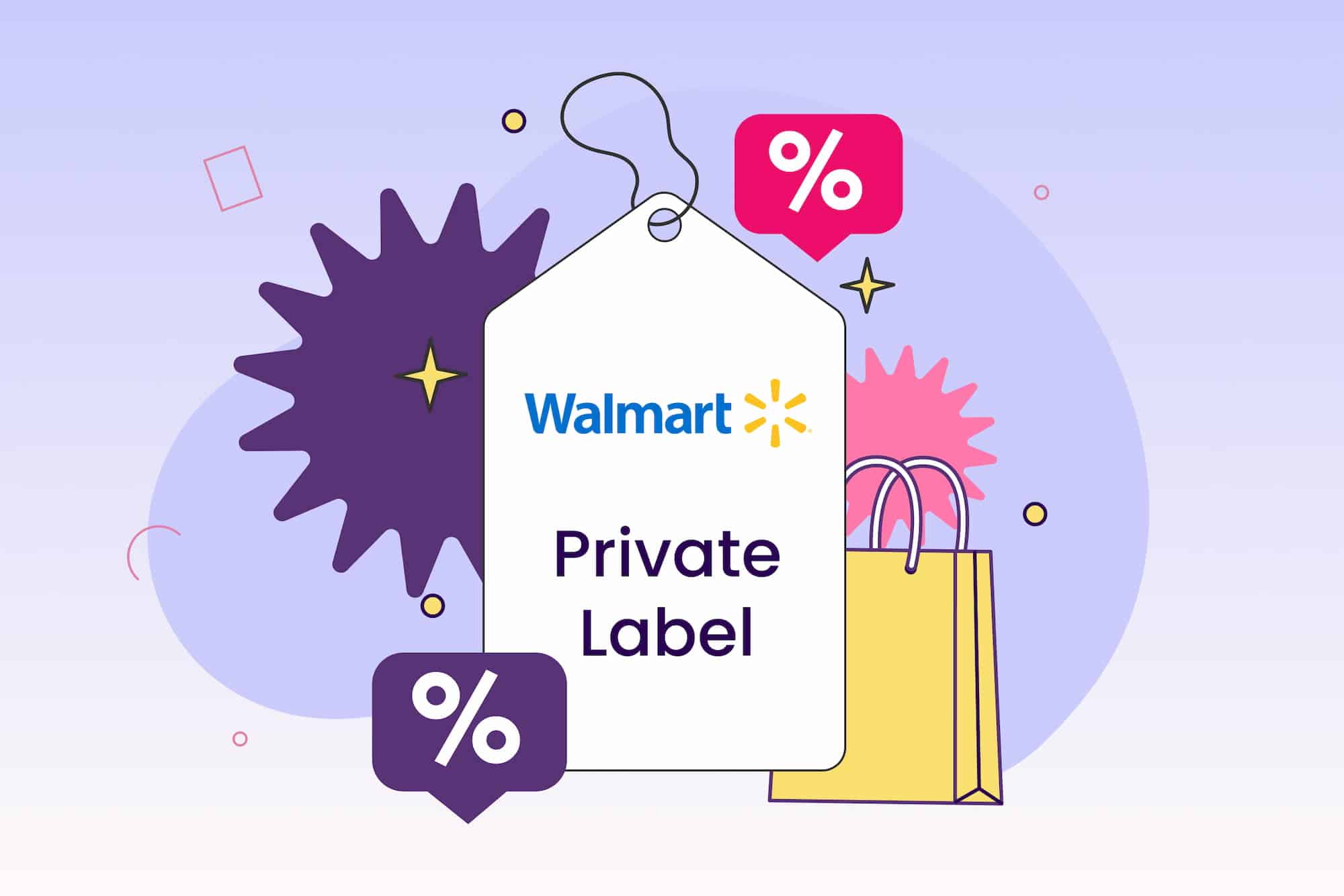On countless store shelves and online marketplaces, private label brands are all around us. These products, branded as unique options available only via one retailer or marketplace, are part of how companies can set themselves apart. Exclusive offerings keep customers coming back, and private label brands are popular for a reason. As one of the most prominent sources for these brand names, it’s no surprise that Walmart private label brands have sales success.
Key takeaways
- Private label brands are sold by many retailers, including Walmart stores and on Walmart Marketplace.
- Walmart maintains numerous private brands, including Great Value, Sam’s Choice, and Ol’ Roy.
- Launching a private label brand to sell products on Walmart may take some effort and coordination, but it can be a great way to build a reputation and attract buyers.
What is Walmart private label?
Walmart private label brands are product lines sold solely in Walmart stores. These are brands buyers can’t find anywhere else and thus associate with Walmart or go to Walmart specifically to buy. Many of these brands, like Great Value, are recognizable to consumers nationwide. The products offered by private labels aren’t generally unique; similar products are widely available from other brands, including others sold in the same stores, but are aggregated under one brand name, usually based on some uniting feature.
Take, for example, Great Value. This private label brand specializes in exactly what the name implies—providing great products at low prices. Private labels can apply to specific kinds of products, like women’s clothes, or products that share characteristics, like food items made with organic ingredients. These brands target particular segments of consumers, like shoppers who want to save money or those who like higher-end food products. This can serve as a way to help buyers find the kinds of items they’re looking for and encourage the development of brand loyalty and repeat shopping.
Walmart private label brand examples
Walmart boasts numerous private label brands across different product categories, from food to clothing. Each has a unique focus, like attire for children or home goods products.
Sam’s Choice
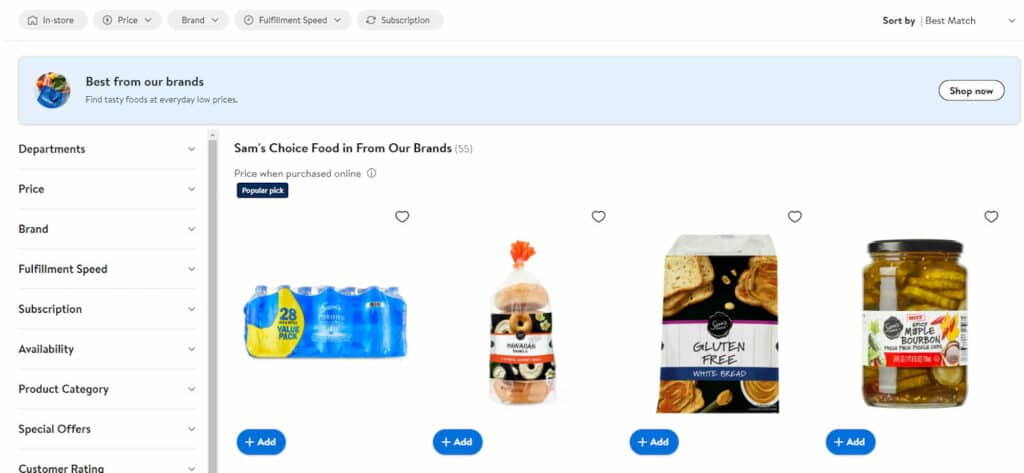
Sam’s Choice is one of Walmart’s most established private label brands. Named after Sam Walton, the Walmart founder, Sam’s American Choice, later renamed Sam’s Choice, is a line of grocery items with an upscale edge that debuted in 1991.
Great Value

Known for low-cost alternatives to popular name-brand products without sacrificing quality, Great Value focuses on home essentials. This includes laundry, cleaning, kitchen, bathroom, and select food items.
Parent’s Choice
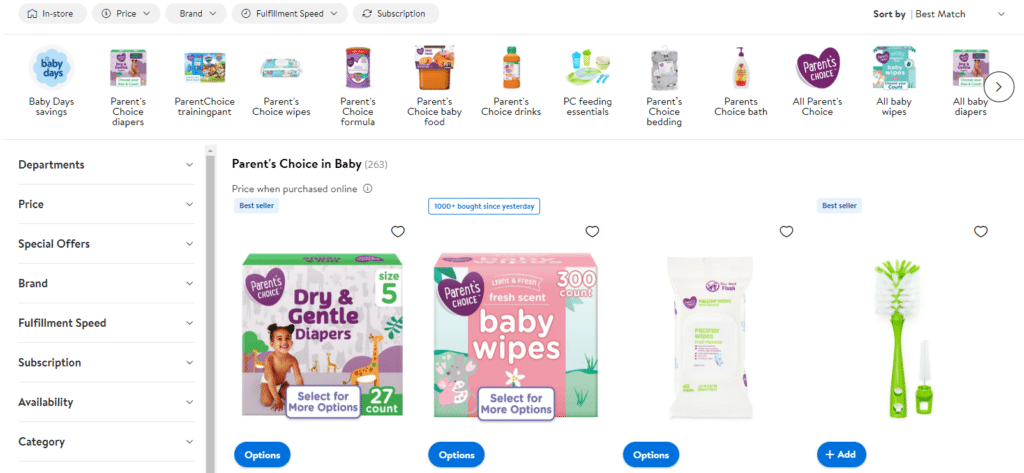
Parent’s Choice is a source for a wide variety of baby-related products. This private label brand sells things like infant and toddler skincare, formula, diapers, food, and bathing items, promising safe, quality items for babies at an affordable price point.
Pen+Gear
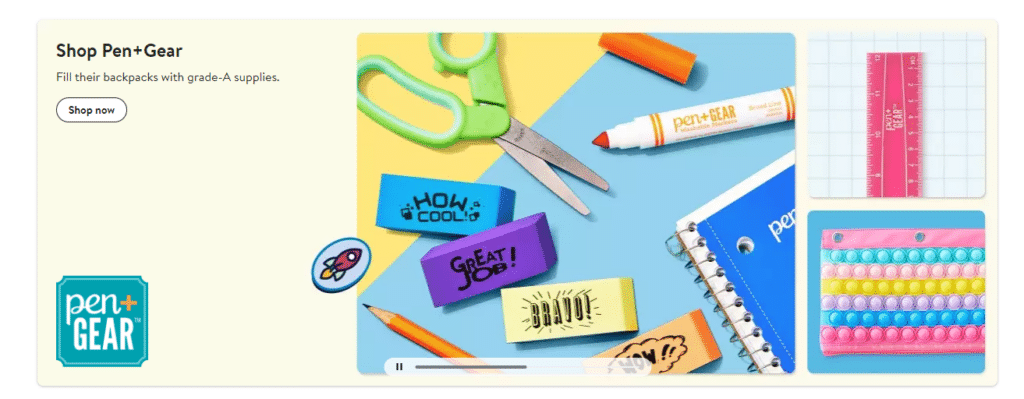
A go-to brand for all things office and school supplies, Pen + Gear sells affordable products for home and school. This includes things like pens, paper, glue, organizers, folders, and moving-related items, like furniture covers and bubble wrap.
Ol’ Roy
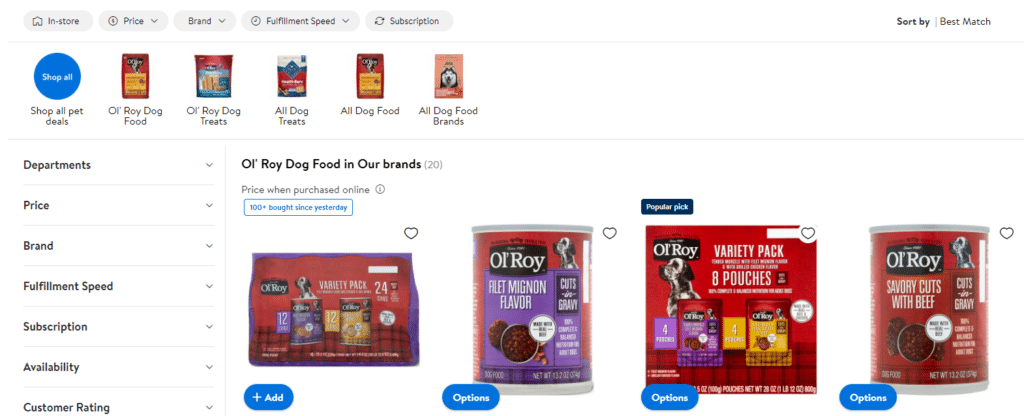
Ol’ Roy, which debuted in the 1980s, is among Walmart’s oldest private label brands. A line of dog food named for the Walmart founder’s dog, Ol’ Roy sells dry food and wet food in various flavors.
Wonder Nation
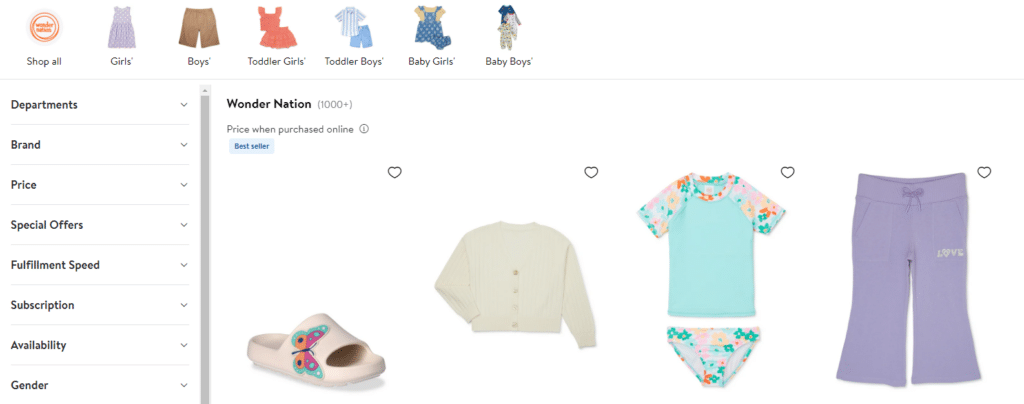
Wonder Nation is a clothing line for kids, including baby and toddler selections. Products are simple and straightforward in style at affordable prices and extend to items like swimsuits, shoes, hats, gloves, and underwear.
Is selling private label products on Walmart worth it?
Walmart has many internal private label brands, including the examples above. However, this doesn’t mean only these brands can be sold on Walmart Marketplace; in fact, distributing private label brands as a Walmart seller can be a great way to build an identity and create a loyal base of customers.
Some of the benefits of selling private label products include the following:
- Ownership of a brand. Unlike dropshipping or resale, the products you’re selling are unique to you, resulting in more control over pricing and a competitive edge.
- Profit margin potential. As with the benefits of ownership, profit margins are another appealing part of being a private label brand. Since you’re not relying on the availability of third parties, you can determine what pricing makes the most sense.
- Customization options. Private labels allow for a way to customize and unify products, creating an identity for your business that’s distinctly your own. This can also include tailoring items to specific demographics, thus improving targeting opportunities.
- Reduced competition for Buy Box positioning. With a private label brand, there’s no competition for other sellers with your products, as no one else will be selling them under the same heading. If someone searches your brand name, only your products will appear.
- Robust product pages. Since your products are exclusive to you and your audience, you can hone keyword use, product photos, videos, and any other advertising material, as you won’t be competing against those selling the exact same or even similar products.
How to sell Walmart private label products
Even if your business is a good fit for private label sales, getting started on Walmart Marketplace may seem a little overwhelming. This is to be expected; launching a Walmart private label brand is a little more complicated than simply listing products for sale. Regardless of what you plan to sell or the results you’re looking to achieve, here’ what to keep in mind when planning a private product label:
Choose a problem to solve
Private label brands are as much about solutions as they are products. As a cohesive group of items that all fit into one particular category, these brands must speak to a particular demographic with specific needs. In order to create a competitive footprint, you need to determine a problem your products can solve that few others are attempting to target. This is how you will draw in customers and keep them coming back for more.
In an ideal situation, this is a problem that your current product line can be tweaked or streamlined to uniquely serve. For example, you may be able to leverage a current bestseller and expand it into a full line of solutions that can appeal to your target audience. Alternatively, this might be identifying a new space where your business can expand.
Choose an ideal customer profile
Once you’ve identified a problem that needs to be solved, determine who this problem is primarily impacting and what might be the best way to target them. For example, in the case of Ol’ Roy, the target market is dog owners who want a premium food choice. However, not everything will be so clear-cut, especially for those with a private label more like Great Value that can potentially target numerous consumers.
Choosing a profile can require a fair bit of market research, but with the right tools in place, this may not be as arduous as it sounds. A comprehensive eCommerce reporting dashboard can help you tap into demographic details, KPIs related to sales and keyword strategies, and other relevant information to isolate open areas of the market. Third-party products can add the most value here, though Walmart does have its own research tool called the Assortment Growth Dashboard.
Market research will be a key part of positioning your products when your private label goes live, so ensure you dive deep when researching available opportunities.
Choose your product
Once you’ve determined a problem that needs a solution and have confirmed an identifiable market, you can choose a product or line of products to sell.
Research is key in this step, too. Using tools similar to the ones you used to uncover customer spending and demographic data, you can drill down into the details of potential products. This can involve digging into customer buying trends, market saturation of particular products, search engine rankings, and sales data to get the best picture possible of who’s selling in the same space. The number of sellers and average price points can also be factors.
The sweet spot will focus on products with adequate demand but few sellers. Determining this is harder than it sounds, of course, but proper research can help you find your niche.
Find a supplier
Unless your company has in-house manufacturing capabilities, you will likely need to partner with a supplier. This may take a little legwork, but many options are available to help you bring your concepts to reality. When evaluating suppliers, consider points like:
- Location,
- Production speed,
- Quality levels,
- Pricing.
Contacting multiple suppliers to compare quotes and output possibilities is generally best. Don’t forget to determine which ones could handle expansion into a wider array of products should you be looking to have a multi-faceted brand.
If possible, request product samples to see what kind of quality and delivery schedule you can expect.
Create your Walmart listing
Once you have your products in development and are nearly ready to go to market, it’s time to create your Walmart listings. These will be central to the success of your brand, particularly in how customers come to perceive your image. As you map out listings, take into account:
- The keywords used throughout your titles and product descriptions.
- Comprehensive and accurate product photos and videos, if relevant.
- Highlights of key features.
- Any other information shoppers may need to see why you’re the best choice, like product dimensions and materials or your USP.
Using Walmart-specific eCommerce tools can be a big advantage in this space. With a way to research keywords and build cohesive campaigns, you can ensure your listings are in peak condition from the start.
Launch your product
When the products you’ve ordered are in your warehouse—or Walmart’s warehouse, if you’re leveraging Walmart’s Fulfillment Services—and you’re satisfied with the quantity and quality, it’s time to launch your products.
How you choose to launch will depend on your goals. Consider a soft launch where you publish your listings and wait a week or two before announcing on social channels, then buy Walmart Sponsored Product ad spots and send an e-blast to an existing mailing list. Regardless, do your best to cover all bases before heading to the next step.
Optimize your Walmart campaigns
Your campaigns must be consistently optimized to ensure your private label gets the attention it deserves.
The right Walmart eCommerce dashboard can be key to the success of your products; without a practiced approach to product listings, keyword use, and bid management, you risk failing to make a mark. Trellis can eliminate the guesswork to help you hit targets every time. Give customers a chance to become familiar with your brand organically and in advertising by using AI and automation to fill the gaps in your methods. Our tools keep your finger on the pulse of the market, leading to increased visibility so your brand can soar. Reach out to us to learn how.
In summary
Walmart private label brands can be a good way to break into a new marketplace or expand an existing footprint. These products, bundled together under a label exclusive to your company, can help you shine, creating a way for customers to explore your offerings and see your business as a legitimate source of quality and consistency.While not a strong option for everyone, particularly those who focus more on dropshipping or who prefer a Walmart automation experience, brands that are positioned properly can see significant growth and the development of customer loyalty.



